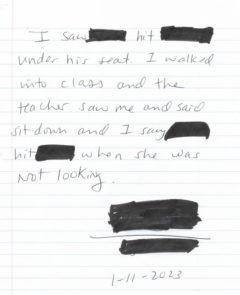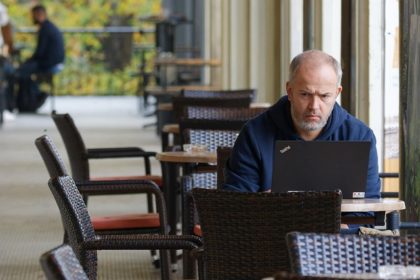Far too frequently, I hear from public school parents that a school will not cough up witness statements used to suspend a student. Is this legal or not?
Documents used to discipline a student are typically considered student records of that student, which their parent must be given upon request.

Parents Have a Right to Student Records
Per California and federal law, parents have a right to get copies of their child’s student records, upon request.
Per Education Code section 49069.7, parents have an absolute right to access student records within five business days of a request.
Under FERPA (Family Education Rights and Privacy Act), the federal version of this, parents have a right within 45 days of a request.
As the California law grants more rights to parents, and does not conflict with FERPA, parents can review and/or receive copies of student records within the five days mandated by 49069.7. Not all states have this rule, so this is a boon to California parents.
What are “Maintained” and “Directly Related” Records?
Under FERPA, if a student record is directly related to a student and is maintained by a public school, the item is a student record.
“Maintained” generally means that the school keeps the data.
The U.S Department of Education explains: “To be considered an education record under FERPA, an educational agency or institution, or a party acting for the agency or institution, also must maintain the record.“
Whether an item is directly related to a student is fact dependent. It depends on the context, what the communication is about, how it is used, and many other factors.
The terms “directly related” and “maintained” are terms of art. They have complex meanings under the law not explored here.

Witness Statements Used to Suspend Are Student Records
If a document is used to discipline a student and is maintained by a school or school district, it should be a student record of the disciplined student.
For example, say a witness statement is written by Student A about Student B fighting. Later, that statement is used to suspend Student B. It should be Student B’s student record. It is directly related to Student B, was used to suspend them, and is maintained by the school.
If a school security officer going to get Student B scribbles on a piece of paper “get Student B at 2” and tosses it, is this a student record? If these types of papers are not regularly kept, and as this may be a personal note, probably not.
Witness statements, summaries, photos, videos, or other evidence about student B, used in student B’s punishment (e.g. suspension, expulsion), should be shared with parents upon request. In expulsions, there are additional laws that apply as well giving parents additional rights to these documents.
“Reasons” Schools Don’t Cough These Student Records Up
I have heard a lot of parent stories about just why a school denied parents discipline evidence, including witness statements. Here are some “reasons” I have heard schools give to parents:
- The documents contain confidential data about other students
- They are not student records
- The parent has no right to them
- There is no other evidence (when there is)
- These are protected records of other students
- Privacy of other students
- An identity would be revealed
- You can see other students in the picture, video etc.
- The records can’t be altered to protect identities
- We can’t afford to block out other students (e.g. in a video)
- They were destroyed
And other wild “reasons” which are totally false.

Redaction (Blocking Out) of Statement Data
One easy fix when a school denies suspension evidence to parents is to tell the school to redact the documents. To redact is to remove information from a document, e.g. to block it out.
For example, if the school says they are worried that a minor student’s name will be revealed and they will be retaliated against, parents can remind the school that they can remove the minor’s name by blocking it out (redaction).
Yes, the documents can also be turned over in their original form, but this rarely happens.
Complaint to Student Privacy Office
Sometimes sneaky things may be done in turning over documents. Maybe some were omitted, or too much was blacked out in a statement, making it indecipherable.
If parents have a dispute over what was turned over or what was denied, they can file a complaint with the Student Privacy Policy Office (SPPO), in the United States Department of Education.
Asserting Records Rights

When faced with a denial of evidence, parents will want to tactfully assert their right to the documents after they bulk up on the law.
Despite the fact that documents and evidence directly related to a student may be education records, parents are constantly denied these documents when requested. It is truly sad.
Why should parents have to hire an attorney to get the records they are already legally entitled to? They shouldn’t. Unfortunately, this happens far too frequently.
Michelle Ball is an attorney representing students across California. As a lawyer with an office in Sacramento, she is centrally located to help. She can assist in many locales, including in Calabasas, Hayward, Cupertino, Carmichael, Lodi, and many other locations where students may need her.

